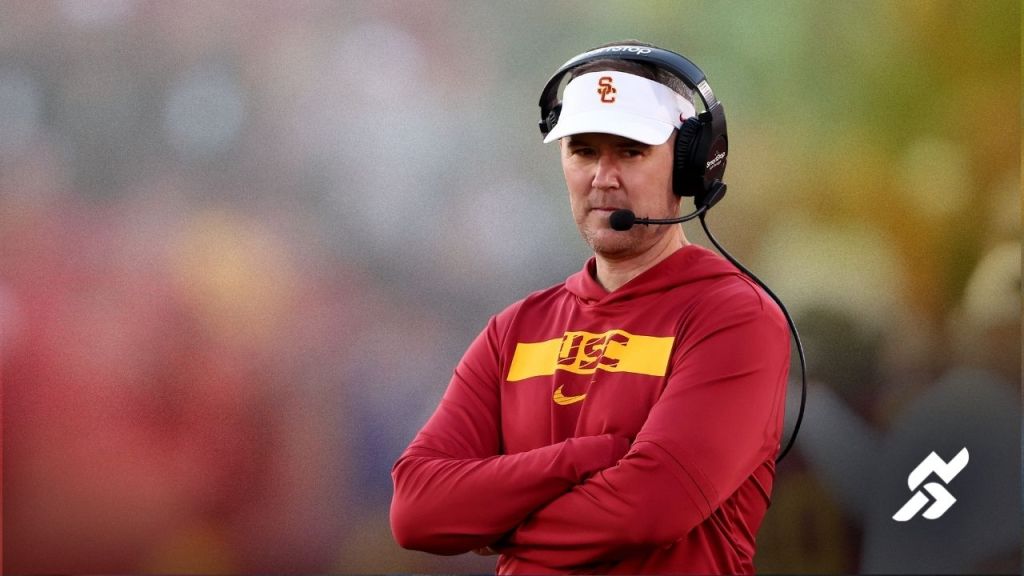USC head football coach Lincoln Riley hopes 24-year-old offensive lineman DaJuanye “DJ” Wingfield will protect quarterback Jayden Maiava this season, but Riley will need an assist from a federal judge to make that happen.
Wingfield is among a growing list of Division I athletes suing the NCAA to remain eligible to play beyond the exhaustion of their eligibility. Last week, the 6-foot-3, 310-pound California native sued in a Los Angeles federal district court, with the case assigned to U.S. District Judge Dolly M. Gee.
In recent comments to the media, Riley said it “isn’t right” that Wingfield has to sue to keep playing and that he hasn’t “seen anything like it in all my years of coaching.” Riley also expressed concern for Wingfield’s mental health as the player goes through the court system, adding Wingfield is “not doing very good.” According to Wingfield’s complaint, the NCAA denied USC a request for a waiver on Wingfield’s behalf.
Represented by attorney JaQay L. Carlyle of Plummer Carlyle Williams, Wingfield raises arguments that have worked for some similarly situated D-I athletes but not for others. Wingfield challenges the NCAA’s five-year eligibility rule, which limits athletes to four seasons of intercollegiate competition—including JUCO competition—in any one sport within a five-year window.
Wingfield claims the rule, which NCAA member conferences and colleges agree to follow as a condition of membership, violates antitrust law because it allegedly has “has substantial anticompetitive effects on two-year or junior colleges and universities that are excluded from NCAA membership.” His complaint references how if he’s denied a chance to play, he’ll lose out on a “once-in-a-lifetime” NIL deal that is worth about $210,000 and is apparently contingent on him suiting up for the Trojans. Wingfield also asserts that NCAA eligibility rules “degrade the quality of competition” by excluding players, and that has “ripple” effects, including on the NFL Draft. Eligibility rules allegedly hinder athletes’ chances to earn NIL deals, since the athletes’ marketability is tied to their school’s brand.
Wingfield’s a seasoned college athlete who has overcome adversity to position himself to play for power conference programs. After playing at Redondo Union High School (Calif.), Wingfield enrolled at El Camino College, a junior college in Torrance, Calif., in 2019 and played for the Warriors. He didn’t play in 2020 due to the COVID-19 pandemic and because he was home caring for his mother; the year didn’t count against this NCAA eligibility. Wingfield played at El Camino in 2021 and received several distinctions, including being named to the Southern California Football Association National Division Central League All-Second Team while ESPN hailed him as the No. 5 JUCO prospect in the state of California.
Winfield transferred to New Mexico State in 2022 but suffered a torn ACL in the Aggies’ first game of the season and was granted a medical redshirt for the season. Wingfield returned to play for New Mexico in 2023, then transferred to Purdue in 2024. He started all 12 games for the Boilermakers at right guard, and transferred to USC—his fourth college—earlier this year.
Although not binding on Gee, a federal district judge in Nevada—which, like California, is part of the Ninth Circuit—recently granted an injunction to Nevada wide receiver Cortez Braham Jr. to play in what will be his seventh season in college sports. U.S. District Judge Miranda M. Du reasoned that Braham is part of a labor market for D-I football that can sign NIL deals and, with the House settlement, receive revenue shares.
The NCAA defeated motions for injunctions brought by several athletes who seek to play after exhausting their eligibility. The association has maintained that eligibility rules fall outside the reach of antitrust scrutiny, which centers on commercial agreements whereas eligibility rules are about how long a college student can play a sport.
In addition, the NCAA has argued that one player’s eligibility lacks market impact since a player who leaves a college is simply replaced by another one who enters that college. Still another argument is that NCAA eligibility rules promote college sports as a unique and fan-appealing brand played by college athletes, whose eligibility is tied in part to their academic progress and whose relationship with their universities is meaningfully different from that between a minor-league player and their team or league.
In a statement shared with Sportico about Wingfield’s lawsuit, an NCAA spokesperson said the association’s eligibility rules “enable student-athletes and schools to have fair competition.” The spokesperson also said the NCAA is “making changes to modernize college sports” and that it “believes partnering with Congress is essential” to address the conflicting rulings on eligibility cases.

